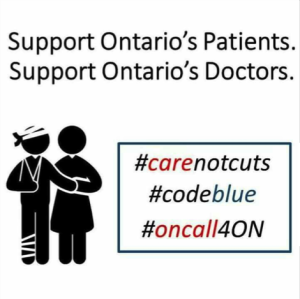The Ontario government is cutting physician services. Two rounds of unilateral fee cuts, with the most recent on October 1, saw physician fees cut by 1.3 percent. Different from other public sector employees, physicians have a commitment to patient care, limiting their legal and ethical ability to take job action. As a medical student not currently earning a salary — but rather paying $24,000 a year in tuition — and junior member of the Ontario Medical Association (OMA), I can only passively observe the reaction of many doctors in Ontario to these cuts, and the accompanying provincial government’s almost apathetic response.
Let’s jump forward five years to when the current graduating medical students will have finished their specialty training. Inevitably, utilization of our health care will increase each year, and even with the current cuts, cost will still be a major issue for the government. Will more unilateral cuts occur then? What’s the end game? In the race to balance the expense of caring for an aging population with the relentless focus on a budget, physicians are too easy a target. As a medical student, I’m concerned.
A recent online survey was conducted in Ontario by family medicine residents, the Ontario College of Family Physicians, the OMA and the College of Family Physicians of Canada. They asked family medicine residents where they were planning on practicing given these recent cuts. The survey showed that at the start of their residency, prior to these announced cuts, 89 percent of residents anticipated setting up practice in Ontario. However when asked about their current plans, only 33 percent planned to stay within the province. That is a significant difference. These cuts may also deter medical students from choosing specialties such as family medicine, or at least may push them to complete their residencies elsewhere. Ontario should thus expect to lose a significant number of newly trained physicians in the coming years. I’m concerned.
Furthermore, the provincial government recently decided to cut 50 residency positions over this year and the next. This follows a year where 55 medical school graduates across Canada were unable to match to a residency position. Students applying to competitive specialties will have to think about applying outside the country to secure a residency position. With the aging population, we are creating a problematic supply and demand situation. I’m concerned.
However, in the media, physicians are being portrayed as greedy — Ontario Health Minister Dr. Eric Hoskins has repeated his mantra that the “average physician makes $360,000.” This is simply not true representation. I imagine this number was created with the intention of misleading the public to wrongly interpret the figure as net pay, without taking into account overhead expenses and the multiple fees physicians must pay. There was a figure circulating around Twitter that nicely laid out the distribution of physician fees that directly goes to overhead costs: approximately 26 percent. Furthermore, the public seems to have forgotten the amount of debt Ontario medical students graduate with that must also be paid off. Lastly, despite what many may think, medical students are not guaranteed a life of privilege. What is often forgotten in all this talk about income is the hushed-up reality of mental illness among medical students. Medical students are at significantly higher risk for burnout, depression and mental illness compared to the general population. Last week the medical student community lost yet another member to suicide at the University of Montreal.
As an active participant on social media, I find the media’s portrayal of physicians discouraging. The message the Ontario government is delivering is undervaluing and undermining the work of physicians. How can patients expect to be able to rely on high-quality care? Already, these cutbacks are starting to affect vulnerable patients. For example, the fee a physician receives for performing urine tests to check for drugs of abuse in patients who are receiving methadone treatment has been cut in half. The clinics treating these at-risk patients are now reducing their services, or closing altogether. This is just one example of many.
As it stands, Ontario’s premier, Kathleen Wynne, and her liberal government, can impose cuts, and then blame the Ontario Medical Association for not negotiating a deal. The public will side with the politicians, aided by the misleading messages from the media. To counter, medical students, residents and physicians have taken to social media to campaign using hashtags on Twitter such as #CareNotCuts, #OnCall4ON and #CodeBlue to raise public awareness. Unfortunately, there has been very little success — it would appear the public cannot be swayed.
Medical students are the next wave of physicians and the uncertainty of our health care system and what’s to come can be frightening. We are desperate to be a part of the solution for the problem that is the future of the Ontario health care system. But, for the most part, we remain only passive onlookers to the government’s imposed cuts.
What can we do?
We can support our colleagues by emphasizing to the public how these cuts harm patient care. Importance should be placed on how the quality of care will decrease, wait times will increase and certain — formerly essential — services will no longer be available. Too often the emphasis on social media has been on highlighting hard work and decreased income. This has proven to have little effect, and so it is necessary to try a different approach. Hopefully in the near future we can be a part of a system where the Ontario Medical Association and the government work together to ensure that there is a health system in place that provides quality care for the patients and fairness to Physicians; that is, of course, if we still choose to practice within Ontario.

